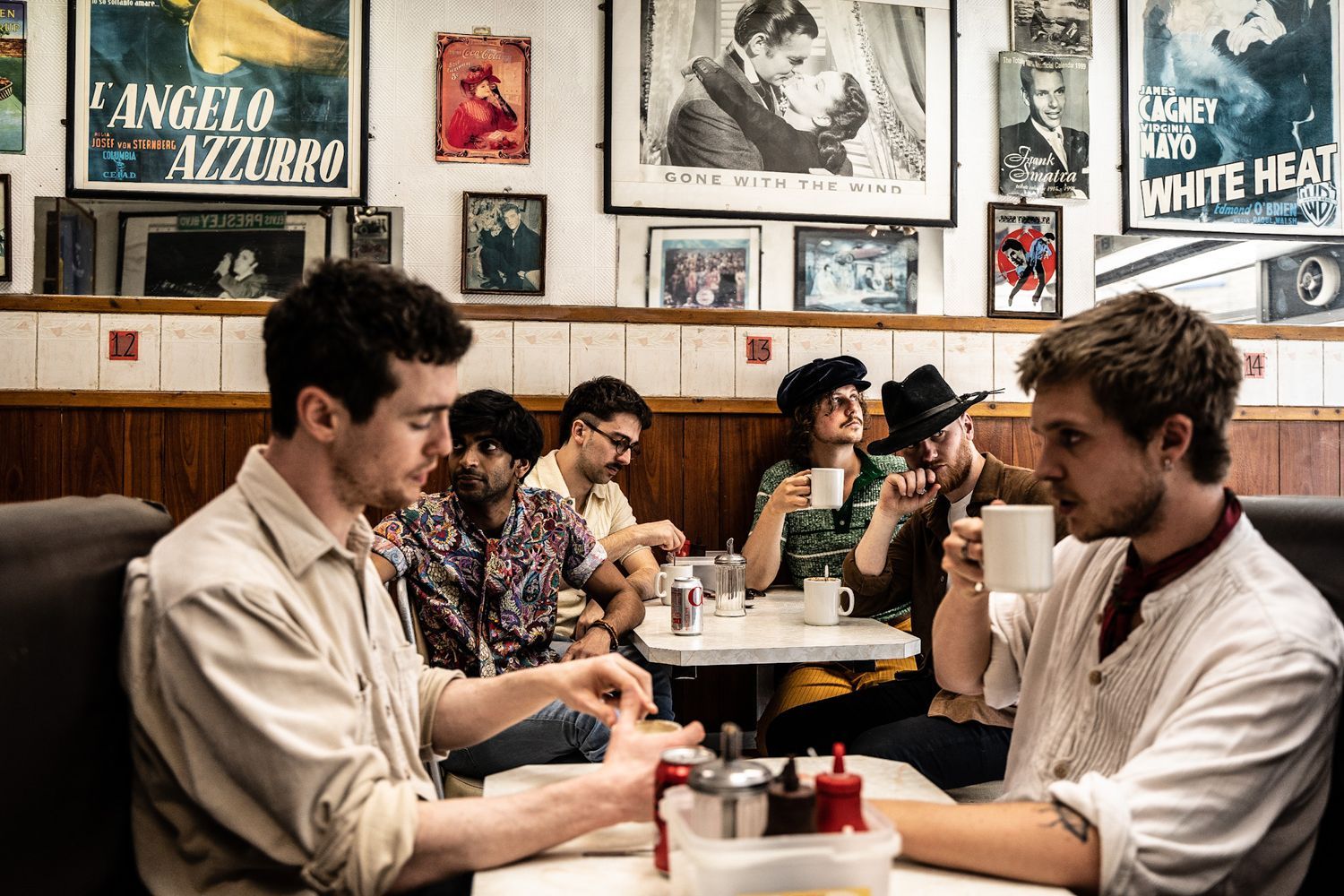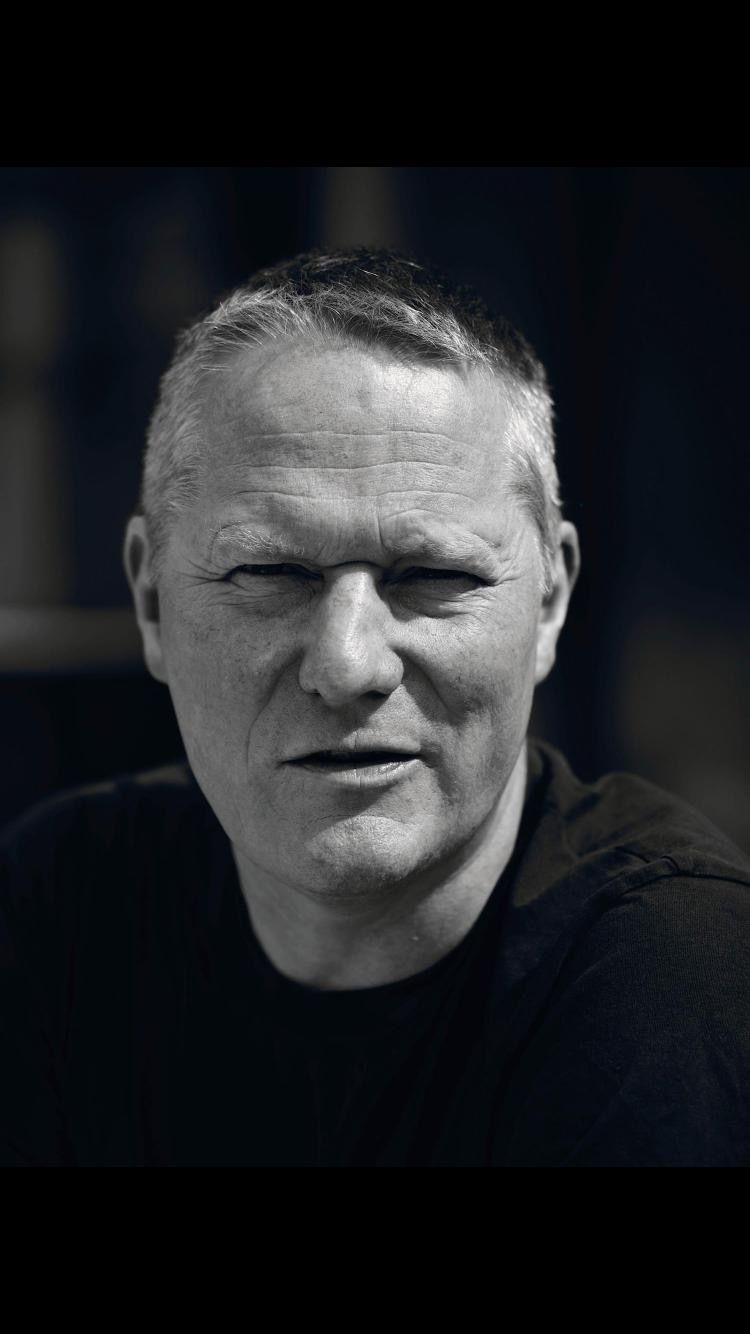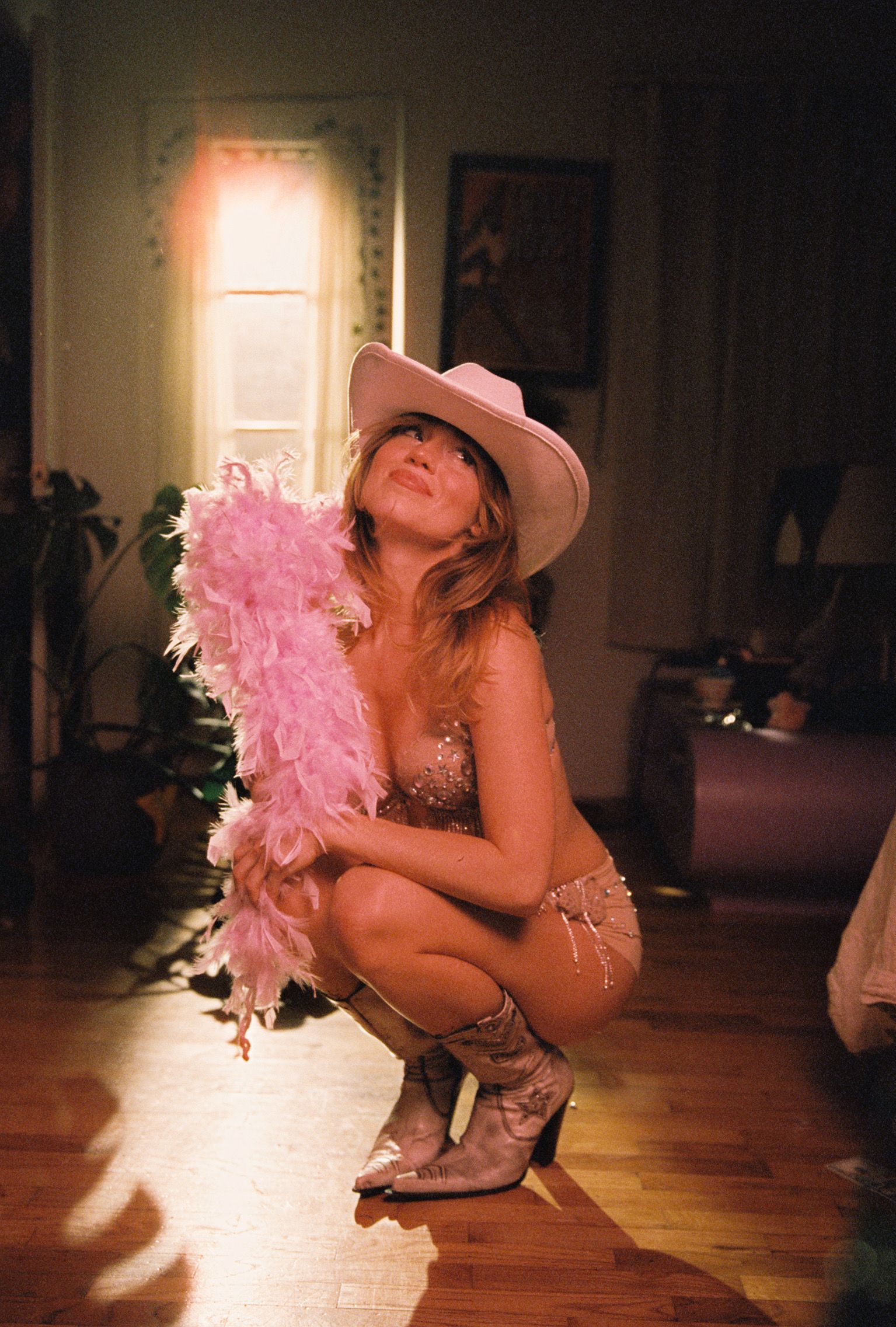Hailing from Manchester, Sleep Walking Animals invites listeners into a world of their own design and creation.
The six-piece band, consisting of Tom Glynn-Carney on lead vocals, Joe Etherington on guitar/vocals, Jack Brett on bass/vocals, Alex Harford on guitar, Nuwan Hugh Perera on keys/vocals, and Bill Caple on drums, formed in 2019 as somewhat of a passion project. As Brett and Etherington recalled during our conversation, Glynn-Carney and Etherington worked together on a few songs when the pair felt disenfranchised by their then-present situations. They sought to bring Brett on board, but he originally declined (though he’ll deny it if you ask him). Through stops and starts, they eventually came together to start writing music to accompany Glynn-Carney’s atmospheric poetry, with Caple, Harford, and Hugh Perera joining the mix along the way.
The resulting group, Sleep Walking Animals, was tasked with the monumental feat of producing and promoting music during the 2020 pandemic. Amid numerous lockdowns in the U.K., they found a way to record and release an array of beautiful, ethereal singles, each of which showcases their unique sound. From Aengus’ Fool to Dance Laura Dance, Freedom Song, and Wild Folk, Sleep Walking Animals has already started to create a portfolio that serves as an authentic representation of who they are and of what music means to them.
On the horizon for SWA are two forthcoming EPs, and, hopefully, a tour. The process of organizing six different schedules to get everyone in the same place at the same time is a difficult one, but one that they’re all willing to work together on for the sake of the music. Speaking with Brett and Etherington, they’re aware of the hurdles they’ll have to overcome to take Sleep Walking Animals to the next level, but they’re not afraid of the challenge. Listening to their insight, along with a constant rotation of their songs on Spotify, it’s clear that they’re on the cusp of something really special—something other bands only ever dream of achieving.
Speaking with 1883 Magazine, SWA detailed their songwriting process, the immense fulfillment they gain from creatively tackling everything on their own, what they hope to accomplish long-term, and much more.
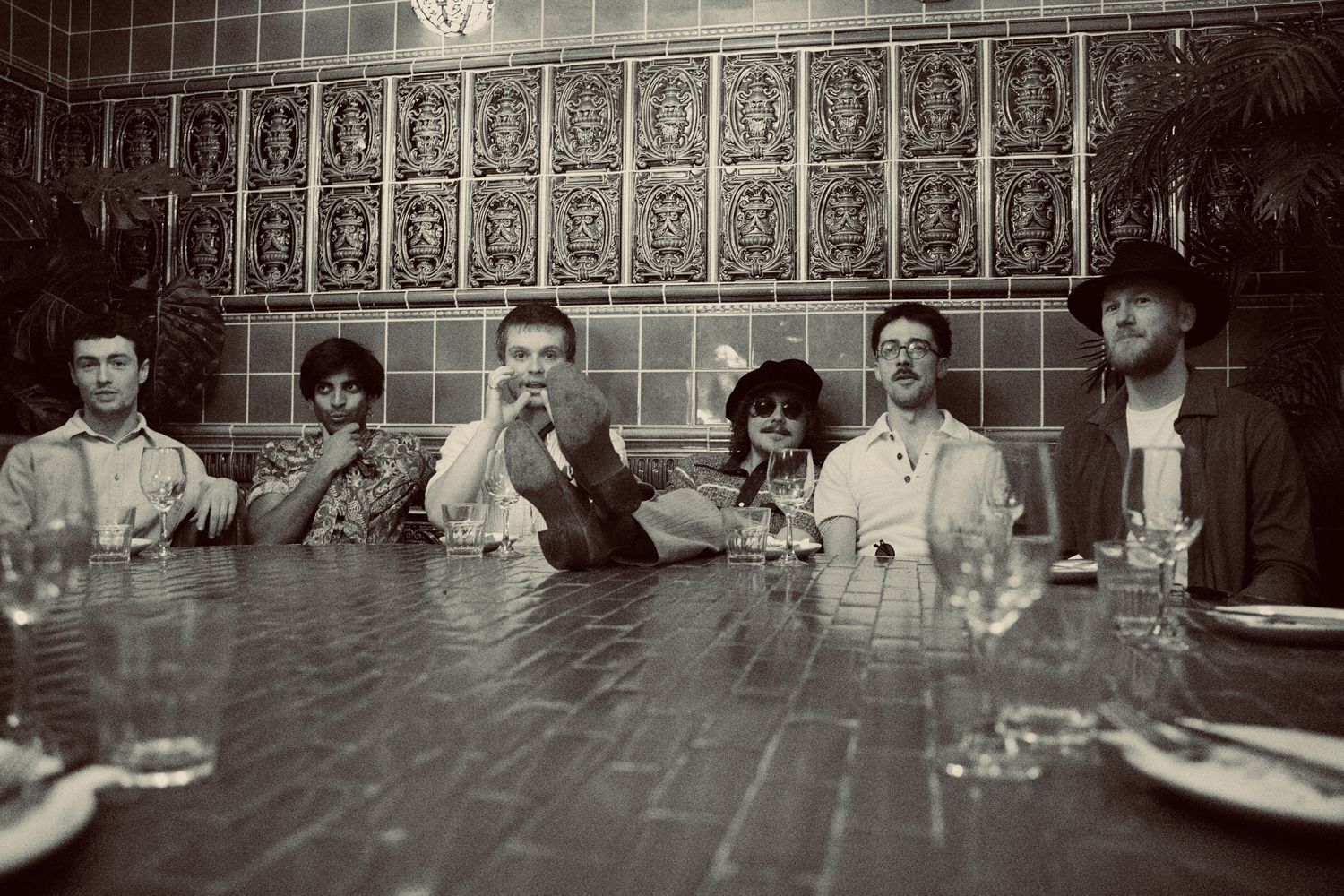
You guys have talked a little bit about how you formed the band and how you came together. When you did that, though, did you set out with clear intentions of being like, “This is going to be a serious band and we’re going to do all these things with it”? Or did that evolve over time?
Jack: Joe, you set up the band with Tom, didn’t you?
Joe: It definitely evolved over time. It started as I was acting and Tom was doing a play on Broadway, and we were both feeling a bit shit about it. So, we just started texting about music when Tom was in America—little ideas and stuff. And then it kept progressing. We were getting more people involved. I used to live with Jack, and when I first asked him, he was like, “Nah. You’re all right, though.” He always says that didn’t happen! But, it one hundred percent did happen.
Jack: I think it did….you played me some of your first songs….
You were like, “I can’t be involved in that. I just can’t.”
Jack: Yeah, artistically we don’t correlate. [All laugh].
Joe: But then Tom came ‘round to mine…and didn’t we just jam, or something?
Jack: What happened? I can’t remember. I know me and Joe used to go busking, so that’s when I started doing that with him in London. And then I guess Tom came ‘round with this other guy who’s not in the band anymore and we must have jammed something. I remember writing Aengus’ Fool. Tom sent me the lyrics, and I wrote it. So, I wonder whether that’s the first one. Is that the first one where we all played together?
Joe: Yeah. So, we went through an Arctic Monkeys phase but with skiffle instruments.
Something the world has never heard before.
Jack: Yeah, they were very catchy. They were very pop-y. I don’t know how, but there was a sudden click with Tom’s writing. I can remember loads of the lyrics that he had written—Wild Folk was there, and Aengus, and I’d printed them out ready for us to try and write some music to them. As I was reading it, I was like, “What the fuck is this?” It was mad. I said to Joe, because we were living together, I was like, “These are mad.” [All laugh]. So, I don’t know where it suddenly clicked for Tom. Maybe he was always writing poetry but just didn’t put them into songs. When he started making them more poetic, I guess, is when I started to think we had a winner.
Is that usually how you write the songs—Tom writes out the lyrics and then you create the melodies from there? Or has it been fluid?
Jack: I think so, yeah. It is an odd way of writing, actually. Reading interviews and listening to podcasts with other artists about how they work, usually, the music always comes first. But Tom just writes and writes all these poems and a lot of them are like, “How the fuck do you fit that into music?” Tom writes odd melodies and that kind of thing, but if he is writing a whole structure of a song, it’s usually quite simple. So, it almost doesn’t really matter what the music is doing, it’s more about the words, which I guess is difficult for a six-piece band because we all want to be doing something. Do you know what I mean? We can’t all be playing the same note for five, or six minutes. I think we’ve grown from that. But Tom writes loads of poems, and we try to fit them as best as we can. Joe and Alex write a lot of different melodies.
Joe: But Jack wrote Dance Laure Dance, and he just put it into the group one day after he’d done this whole production on GarageBand, and he was just like, “Oh yeah, I’ve written a song.” And then he basically put the song on our Spotify page, and we were all like, “What the fuck? Where has this come from?” [Laughs].
[Laughs]. Like, “we didn’t agree to this!”
Joe: He is being very modest.
Now I have to prod him a little bit more then.
Joe: Yeah, prod him!
Jack: Back to your first question, we didn’t know we had it in us. That sounds a bit arrogant, but when we all got together, some good things happened and it brought good stuff out of us that we didn’t really know we could do.
Was there a specific moment when you guys were playing together or listening to something back where you were like, “This is it, this is working, this is actually going to be something more than we thought it was going to be”?
Joe: It’s probably Aengus’ Fool. That was the first proper one.
Jack: Yeah, because it was different and the chords were different, and the sheets and time signatures were different. And then we carried that across and we all wrote Wild Folk together in a room, which was really cool. Which, I guess if we keep expanding and get quite big, it’ll be a moment that we look back on to be like, “That was it.” It was quite a humbling moment because Joe had this guitar part that was repeating, Tom had the lyrics, and I had a little melody, and we brought it all together. That was a big moment for us as well. Now, we’re trying to repeat that, because we’ve gotten a bit wayward.
Well, I mean, that has to be tough if you’re all doing your own thing on top of doing things for the band and living your lives, and trying to find time for everything else in between.
Jack: Yeah, tell me about it. [All laugh].
It’s difficult balancing everything. I have a full-time job, and then I do this and I do other creative projects on the side, and it’s maddening sometimes to be like, “I want to do the thing that fulfills me, but then I also have to do the things that I have to do to pay the bills.” It’s a weird balance.
Jack: It’s just an age-old thing, isn’t it? Especially doing creative things we want to do, it’s so tough. A lot of artists, musicians, and bands, they start a lot younger than we did and they can have that security of living at home whilst pursuing this one thing. Which we all started out doing with acting because we all started out acting. That’s quite a unifying, kind of bizarre thing. Bill still wants to do it, and he’s moved to London to really try to do it. Nuwan is smashing it with West End shows, and then obviously, Tom’s doing his dragon shit.
Joe: “Dragon shit.” [All laugh].
Jack: I undermined that completely.



That’s just going to be the pull quote from this entire article: “Tom’s doing his dragon shit.”
Jack: Tom’s riding some dragons, so it’s difficult, but it’s something that we maybe take for granted, or don’t speak about enough, but it could be the thing that makes us special.
Joe: That we don’t have time to do it.
Jack: Yeah, exactly. But in terms of us wanting to be actors first…
Joe: Our first mistake.
[All laugh]. You went down the wrong path right off the bat?
Jack: Well, we wouldn’t have met. That’s the main thing. And who knows, if we would’ve pursued music first…we all played music when we were little. That is a thing that we all have in common as well. We just didn’t end up pursuing it, really. But maybe if we had pursued that instead, we wouldn’t be doing it now. Do you know what I mean? You never know what might happen.
That’s true. This is a good segue, actually. You all have these other creative pursuits, whether it’s music or acting or everything else you do on the side, but what do you get out of Sleep Walking Animals that you don’t get creatively from your other projects?
Jack: It’s everything, isn’t it? We’re doing it all ourselves. We’ve got complete creative control at the moment. Writing, mixing, producing, and recording everything, it’s the ultimate creative experience. And then doing all the artwork, all the promotion, it’s everything, creatively, your brain can work out.
Joe: One thing that pissed me off, [all laugh], it didn’t piss me off, but. When you’re acting, you’re auditioning all the time, and you’re going into all these different rooms, meeting all these different creative teams, and it’s always on their terms. They determine whether you’re able to do the job. You have to go in and audition to be creative. Which is something I found really annoying.
Yeah, you can’t just go in there creatively as free as you would in your personal projects.
Jack: And you’re not yourself, either. It’s like you hold back such an important part of being human for so long. You’re not being yourself for so long—you don’t know who you fucking are anymore. Writing music is so vulnerable, it’s like showing yourself completely. That’s really cathartic, and a really appealing thing to do, which I don’t think you can really get from acting. You can obviously draw upon memories, but writing about your life, whether you think about it or not, it’s always about yourself. It’s coming from something you experienced.
That sounds like it’s very interesting.
Jack: Sounds like it’s better than acting. [Laughs].
Music is better than acting all the way? You’re just going for music every time?
Jack: Yeah. It’s easier to do stuff yourself and to get gigs, and all of that. It would be easier if we were all together all the time.
You mentioned that you guys do everything—you do the producing, you obviously come up with creative ideas for the music videos, and you come up with all these other outside things that represent the band in a visual way. Do you want to continue doing that and being the people who are solely responsible for everything forever? And also, how do you do that in a way that feels authentic to all of you as individuals while still creating this cohesive image for the band?
Jack: That’s a really good question.
Thank you.
Jack: What was the first bit?
Oh, if you want to continue doing everything by yourself.
Jack: We want people to do that for us more and more now, don’t we? Or, at least, we want more help doing it, anyway. At the start, it was us against the world, and now we’ve realized that we need a few more people on our side to help us because there’s only so far we can get calling in favors. I mean, we could carry on doing it, but it’s like a democracy, it’s difficult sometimes because some people end up wanting to do more or wanting to do less, or just wanting to do the music. Some people don’t care so much about the image, but the music is the most important thing, which we’re trying to get back to now. Because we may have just edged over the wrong side of it. Maybe we are a little bit of an internet band with a lot of this being on social media and through videos and things like that. But the music should really come first.
Especially because we live in such a digital age where that fuels everything. Unfortunately, you need it. Social media is one of the things that drives me crazy about my job because it’s needed to do anything that’s sort of productive nowadays. Which is frustrating, because you do want to be out there, you want to be in person with people and play shows and do it that way, but it all feeds into each other.
Jack: I think we feel like we’ve paid our dues with that. So, now we want someone to do it for us.
Joe: Because we started just before the lockdowns, it’s mostly all we’ve known—posting videos and recording over the internet and stuff.
Jack: Yeah, it’s weird though, isn’t it? We had a lot of gigs lined up and it would’ve been our first gigs and then obviously they were all canceled because of COVID, and then we had to do everything online. Joe’s right that we’re a product of this pandemic and having to do everything online, which is quite interesting. Now we’re trying to come out on the other side of that.
Playing more shows, is that on the horizon for you guys? Do you feel like that’s a good next step to take?
Jack: Not next year, just because Tom’s very busy, but we’ve got some festivals lined up, and we’ve got two EPs we’re working on. One is coming out next summer, and then one probably not until Christmas, but the year after that. So, what’s that? 2024.
Oh, God!
Jack: Yeah! That’s mad, isn’t it? So, we’re starting to plan fucking two years in advance, which is crazy, but it’s what you’re supposed to do. You’ve got to do that.
And especially accounting for everyone’s schedule and who has free time to record things and play shows. That’s difficult when you all have these other obligations and things you need to do.
Jack: We’ve just signed with a label, though, which is good.
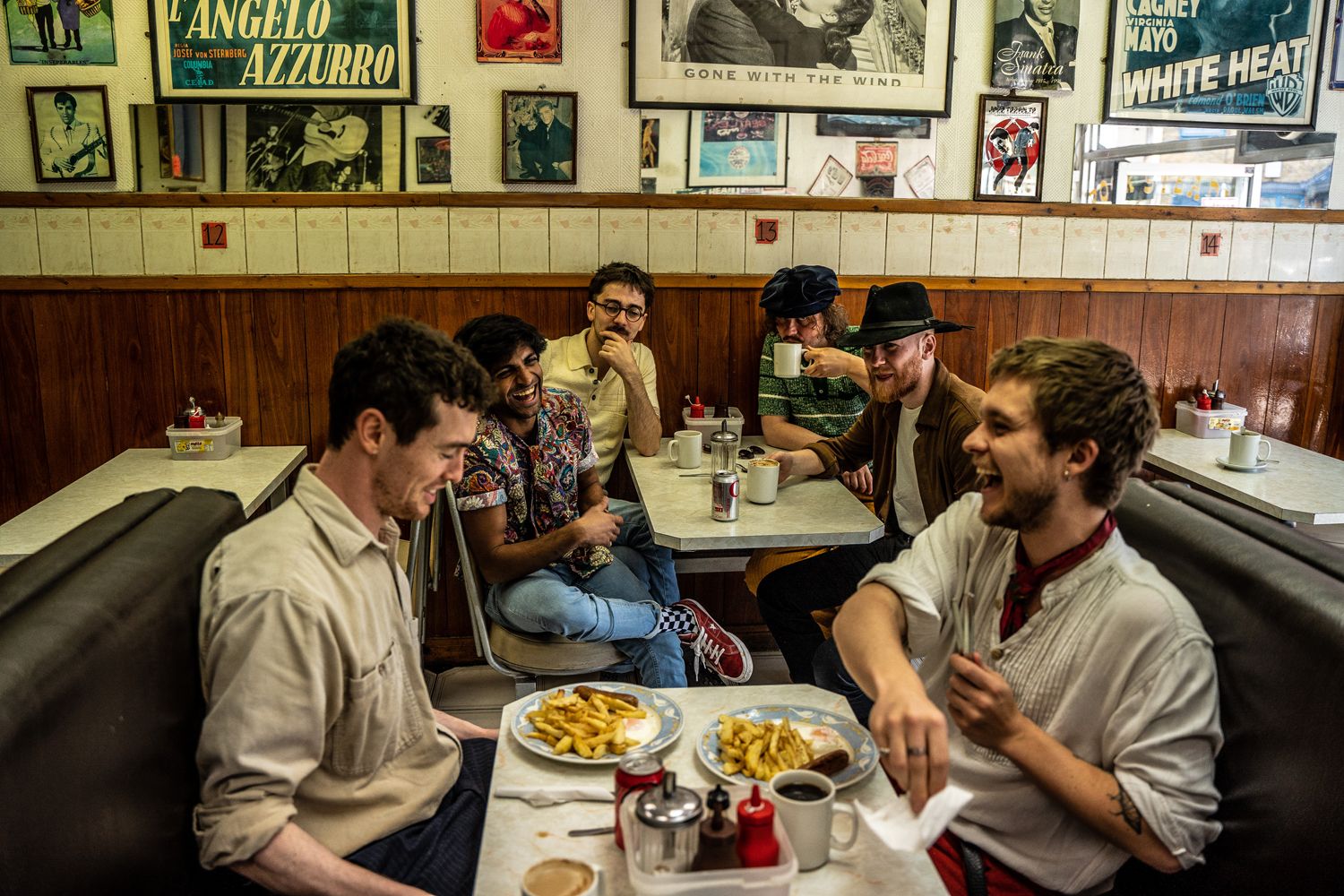
Oh my gosh! Congratulations!
Jack: Thank you. They’re called…what are they called? Black Sea Records?
Joe: Yeah.
Jack: We’re a bit tentative about it because we don’t really know what’s going to happen. Do you know what I mean? So, we’re not celebrating or anything.
Joe: We celebrated a little bit. [All laugh].
Jack: And then we didn’t want to sign, and now we want to sign again.
Joe: It just all gets very serious.
It has to be complex trying to navigate that and figure out if it’s the right thing for you.
Joe: Commitment. Isn’t it horrible? [All laugh].
Jack: To circle back to your first question again, we were doing it for fun because it was better than acting, and it was more fun being in a group of close friends. You all trust each other and love each other, and you’re making something very exposing…you’re making music, and it feels really good and really safe. And, our product was quite good, apparently. So, it’s going from that to essentially putting it all into someone else’s hands. That’s the tricky thing. And now we’ve got fucking deadlines. [Laughs]. We’re going to write an EP and it’s going to be really good and we can put a bit more time into it, potentially, and get it sounding really good. So, that’s exciting. That’ll be out in the summer.
Joe: We’ve always worked better on deadlines anyway. Do you remember that graduation/prom gig? We had like 30 songs we had to learn.
Oh my God. That sounds daunting.
Joe: It was. It was crazy.
Jack: It was like a uni graduation, prom, ball, thing. I don’t know what the fuck you’d call it in America. [All laugh]. But we got roped into playing it.
Joe: I don’t even know what we sounded like. We didn’t even have a drummer!
Oh wow! So, what did you do?
Joe: We had a kick. I was doing the kick.
Jack: Yeah, we were more Mumford and Sons, back then, playing Arctic Monkeys songs.
I mean, that sounds like an interesting fusion of things. I love both of those bands. But it also seems hectic and stressful for you to have to perform that way.
Jack: Yeah, it was for Joe. [Laughs].
[Laughs]. Yeah, because he had to do six different things at once!
Joe: Like Dick van Dyke in Mary Poppins! Yeah, I don’t want to do that ever again. [Laughs].
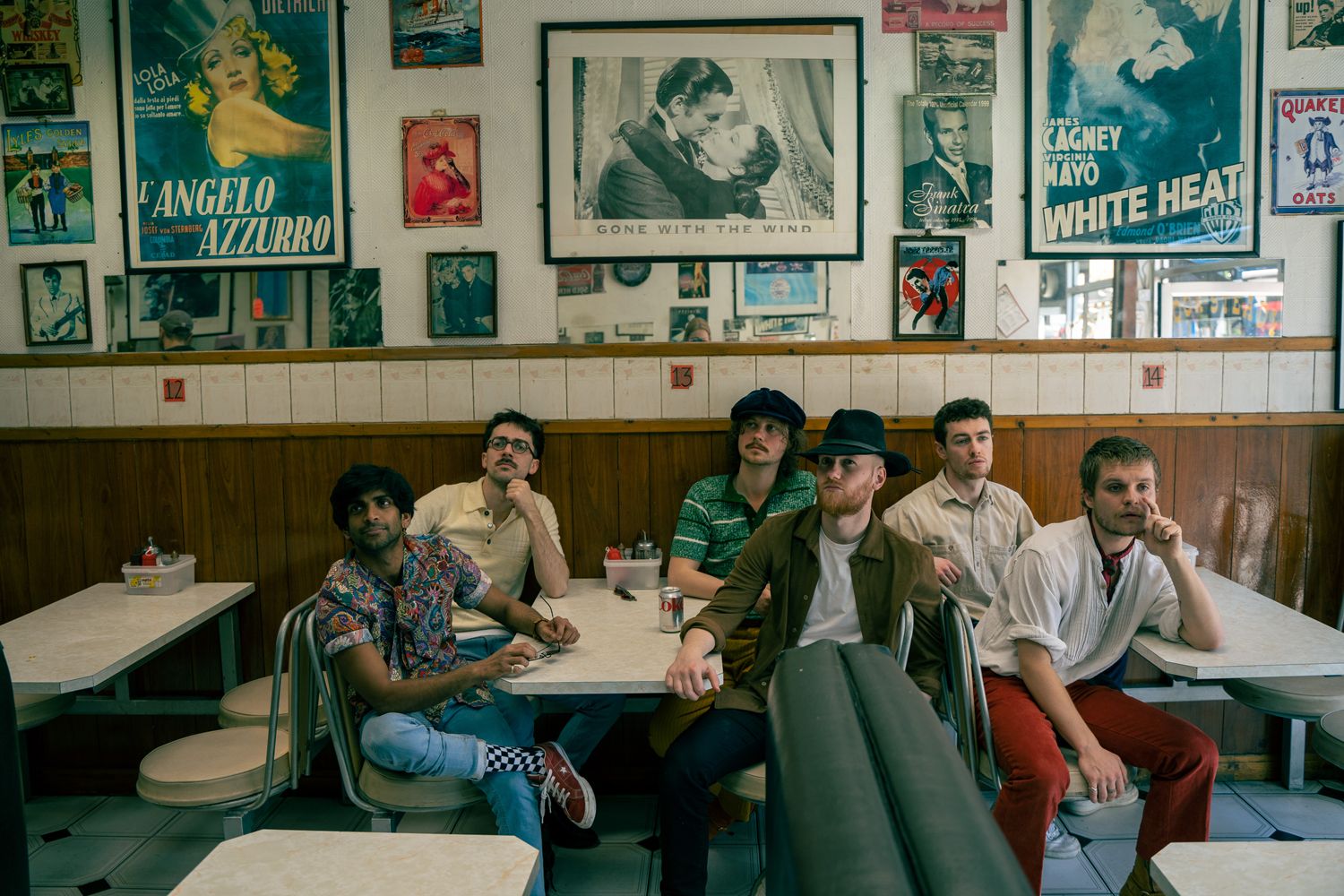
Which is why it’s necessary to have everybody in the same place at the same time.
[Joe’s phone rings].
Joe: Oh, sorry!
Jack: Turn that off! Who’s that? Your mom?
It’s his mom. He just doesn’t want to say it. I’ll put it in the interview: Joe left to take a phone call with his mom.
Jack: Joe loves his mom so much.
Joe: Fuck off. [All laugh].
[To Jack]: Do you like his mom?
Joe: Do I love my mom? Yeah, I love my mom.
Jack: [Laughs].
If you want to talk about your relationship with your mom, this would be a perfect segue. Does she like the band?
Jack: We’ve all got complicated relationships with our mothers. In fact, Tom always mentions “mother” in all of his writing. There’s definitely an Oedipus thing going on there. And none of us can tell our moms that we smoke. That’s bad though, isn’t it? My mom caught me smoking once when I was 18. She drove past and I was smoking outside this shop. It was so unlikely. I was like, “How is my mom going past now in the car?”
She had a Spidey sense, she knew you were doing something wrong.
Jack: “My son’s smoking!” And she saw me and drove off and didn’t say anything.
It’s weird when you’re older and you’re trying to have a different type of relationship with your mom where you’re interacting as two adults. I still don’t swear in front of my mom, and I’m 30, so.
Joe: I’ve been swearing a bit in front of my mom and I keep catching myself, but it makes me feel good. [Both laugh].
“I can swear if I want to!” But then you feel bad, because you’re like, “It’s my poor sweet mother. She doesn’t want to hear me say this.”
Joe: But I do it in a funny way. So, it’s all right.
Speaking of your live performances, what do I expect going to one of your shows? Chatting? No chatting? Depends on what you’re doing?
Jack: I don’t like all the chat shit. Although, when we get pissed live, we tend to chat shit. Or at least, I tend to chat shit when I get pissed.
Joe: Well because I’m too poor to have more than one guitar, and we write in weird signatures, it takes me ages to tune the guitar. So, they all have to fill in and say shit until I’m ready.
Jack: Like, “For fuck’s sake, Joe!”
More bullying!
Joe: I need to tune it, otherwise it’ll sound like shit.
Jack: And then I’ll just start the intro to the next song and Joe won’t have tuned it. [Laughs].
Joe: And he is like fucking flat as a pancake going into this song, and I’m like, “Oh, this is the worst.”
So, Joe just feels terrible about himself the entire time you guys are playing live.
Joe: Oh, yeah.
Jack: A lot of the time, you feel awful playing live.
Joe: It took a long time before I started really enjoying the shows. There were always so many things that could go wrong, and it stressed me out, because we’d been working so hard on the set, and then something gets messed up, but you can’t think about it. More recently, I started enjoying it more.
You’ll have to get out there and play more. I guess it’s like anything where you need repetition to get more comfortable with it and have more of an ability to block everything out. Especially if there’s someone weird in the crowd yelling at you or something.
Joe: Coming from an acting background, it’s not really the crowd that I get nervous about. It’s just because I want it to be good so much that it stresses me out.
You put the pressure on yourself to kind of be like, “I care about this so much and I want it to be projected a specific way.”
Joe: But maybe that’s unsustainable. I don’t know.

It seems like it might be. To pivot a little—you have a new single coming out on December 30th. What can you tell me about the song and how that came together? Why are you releasing this particular single right now?
Jack: Because it’s the only song we’ve recorded for a while. [All laugh].
Joe: We did. We recorded it ages ago.
Jack: We liked the sound of it because it was something slightly new.
Joe: It’s the best sounding one—the best one we recorded.
Jack: We had a great time recording it, and we had a bit of extra time to experiment and have a proper creative time in the studio rather than just going in with deadlines and work. You can only work until six, but we still have to get the drums, and blah blah blah. With Ghost of a King, we felt like we had more freedom with it, which really worked in our favor. It sounds really good. And it sounds a little Christmas-y.
Ooh, that’s nice! Getting festive.
Joe: It’s called the Ghost of a King. But he died at Easter, didn’t he?
Jack: Yeah. That’s why his ghost is back now.
That’s why he’s coming back.
Joe: It’s a warning. You’ll be visited by three spirits.
Jack: It’s not deliberate, but there’s a new beginning feel about it, which is appropriate. We’re releasing it just before New Year, and there’s a nostalgic and reflective feeling to it, which is how a lot of people feel over New Year, and they start to reflect on who they are as a person and who they used to be. That’s kind of what the song is about, and old friends, and the ghosts of who you were and who you knew. It’s quite appropriate actually, so that worked out well.
Did Tom write the lyrics for Ghost of a King as well?
Jack: I wrote them, actually. They’re loosely inspired by a trip back to the place I grew up in. Seeing old friends and trying to reconnect with them. Feeling that bygone pace of life. Looking back on the person you were to the people you once knew. How easy it is to loose connection. Maybe you move on or maybe you feel that pull back. Maybe you try to forget the past completely. Something like that.
Are you just releasing the single or is there a video that’s going with this as well?
Jack: No, just the song. I’m supposed to create some promo material for it. I don’t really know what to do. So, if you’ve got any ideas, Sam.
[Laughs]. I’m always happy to help. I used to be a social media manager for a fashion brand, even though I know nothing about fashion. So, I can pull stuff out of thin air if needed to help.
Joe: What do you reckon we should do then?
Well, you usually use photos to do your promotions. That’s probably what you want to go with—it’s best to do something that’s already on brand for you and how you promote things. Do you have unreleased images that you haven’t used in promotions before?
Jack: Is this consultation going to cost us anything?
[Laughs]. No, no. Free of charge!
Jack: Great! We’ve got a lot of old photos, which we need to recycle, I guess. That’s all we can do at the moment because Tom is in LA right now. To be honest, we wanted to cold-release it—just release it and see what happens. People have been waiting for new music from us for a while, so we don’t feel any pressure releasing it. We want to just release it so people can listen to some new stuff.
But you’re doing the listening party, right? Aren’t you doing that on Friday, December 16th?
Jack: Yeah! We’ve got a listening party which was an apology for saying it was going to be out on the 16th, but not releasing it on the 16th. But yeah, so, that would be sweet, to be honest. It’ll probably just be me and Joe again.
I’ll join in. I signed up for your mailing list so I can get the advance tickets.
Jack: When we put the post up, like, 200 people subscribed, so we could get 500 people listening. That would be mad.
If it was all five of you, you could each take 100 fans to talk to.
Jack: To be fair, they’ll probably all want to talk about the final episode of Tom’s dragon show, when he was wearing a little crown. “Was it made of Gorgan Quartz or was it made from Tian Leather?”
And then you have to be his spokesperson if he’s not going to be there. When you guys are making your songs, how do you figure out the melody and what the guitar is going to sound like, and what the percussion and bass are going to sound like? I’m not musical at all, so I’m fascinated by the idea of you just looking at words on a page and being like, “This is the musical depiction of these words.”
Jack: It’s just what happens…
Joe: It’s just playing around, isn’t it?
Jack: I don’t think you can learn it necessarily. Do you know what I mean? It’s just intrinsic or whatever. You can get influenced, and that kind of thing. But yeah, whatever song you have, it always comes out. [Singsong voice] Whatever song is in your heart, it will always shine through.
That was really beautiful. [All start laughing].
Joe: We still don’t really have a process of how we write, to be honest. You throw shit at the wall and see what sticks.
Jack: If someone writes a good demo then we just fucking play it. We do want to try and be more brutal, like, “That’s not a good song.” Because we know what a good song sounds like.
Well, you had mentioned earlier that at the beginning of SWA, you sounded like Arctic Monkeys and Mumford and Sons. How do you balance being influenced by these other bands while still authentically sounding like yourself and not veering too far into that territory of being like, “Does this sound like us or does this sound like them?”
Jack: We’d start a new band. [All laugh].
Joe: That’s a good question. Is it consciously trying to make it not sound like someone else? It’s something that all bands and artists contend with. It’s the progression of their sound, and I guess whether the fans will like it or not, but it’s what they want to play now, what they’re being influenced by at the time. We’re quite lucky that we haven’t released much music. So, our sound is progressing a lot on its own. I can really see this EP being different, in a way, and being slightly more experimental and not just having an acoustic guitar for the whole thing—we’ll have a big, heavy guitar riff, or something. It’s going to be more thoughtful in that respect, which is a good thing.
Jack: Me and Joe are listening to more left-field stuff, but that will always come into it. Tom will always be more concrete in what he wants the band to sound like. And we’re happy to go with that. Because we’ll put loads of harmonies in, and then it’ll sound like us because of that. I don’t think that’s ever going to be something we’re not going to put in. We like doing harmonies, we’re good at it. And we are a band that consists of five singers, to be honest. We can all sing. So I think that’s a USB…
Joe: A USB Port? [All laugh].
Jack: What’s it called? A USP? A unique selling point?
Joe: Unique Selling Point.
Jack: That’s the thing, isn’t it?
Joe: Yeah, I was very confused.
I just assumed I didn’t know what the term was because I don’t know anything about music.
Jack: We will sound like us because it’s us playing, that’s the crux of it. We haven’t written five albums, so we don’t have that problem yet. Anything we release is going to be us because people haven’t heard much music yet.
Yeah, it’s all very distinctive. Even though the songs separately have their own emotion and feeling and elements to them, you can cohesively listen to everything and identify which artist it is, which I think is interesting. Because I do think sometimes people vary a little too much and lose what was appealing about them from the start.
Jack: That’s really easy to do, especially if you’re on your sixth album. Personally, I want to try and write another Wild Folk-sounding song. It’s really good, it’s just that we’ve played it so many times, we don’t even listen to it anymore.
And it would be nice to do something similar but that’s fresh and different.
Joe: Gotta get the lyrics!
You’ll have to get some folklore-type thing to inspire you.
Jack: Yeah, Tom loves that shit.
Joe: It’s funny, guys, I was talking to Tom today, and we were talking about when you listen to a song, what do you hear first? And Tom said, for him, he always hears the lyrics first. And when I listen to a song, I don’t even listen to the lyrics sometimes, which I think is good.
I’ve never thought about that in terms of what I experience first in a song. It’s usually vocals for me because if I don’t like the singer’s voice, I don’t like the band. It could be the best band in the world, and if I don’t like the singer’s voice, I can’t get into the music.
Jack: There’s a lot riding on the lead singer’s shoulders. Especially if they’re writing the lyrics as well. We all really love Joy Division, and I’m reading a lot of books about them, and they didn’t have a fucking clue what Ian Curtis was writing about. They were just playing music and letting him do the lyrics, that kind of thing. There is often a dislocation like that within bands. I don’t really know what a lot of the songs are about, because Tom’s written them, but I don’t think we need to know.
You’re just representing the emotion of it and how it makes you feel.
Jack: Yeah.
Joe: Yeah, exactly.
It happens to be cohesive for all of you in that you get a similar sentiment from it.
Jack: That’s what Radiohead has always been really good at. If you watch them live, they’re all singing the lyrics and playing it on their own instruments, but there’s a synergy there. They’re all together, which we could do more of. That’s the trouble if you play something for so long, like when we play Wild Folk live now, we should all get into that groove of what the song’s about, but sometimes it isn’t easy if you’re bored of playing the same note for five minutes.
You’re just disconnected from it at that point because you’ve been doing it so often?
Jack: No, I like the “woohoo.” I feel very emotionally connected to them. That’s not me being cynical. I actually do, I really like the “wahoos.”
They’re fantastic. I have to say, the live version of the song is my favorite version.
Joe: Yeah, the St. Augustine’s one?
Yeah! I feel like there’s a very interesting texture to it, to all of your voices. And I love really specific parts of the song and how your voices sound compared to the recorded one. I just really like that.
Joe: It was fucking freezing. That’s probably why. [All laugh]. It’s freezing in the video. You can literally see Tom’s breath.
That affects the way you sing? Well, I guess you’re saying that it does affect the way you’re projecting your voice if it’s cold. [Laughs].
Jack: Yeah, probably. And we’re in the church, so you’re aware of the natural acoustics and the rebar and stuff within the church. I guess you’re playing with that, in a way. What did you say?
Joe: [Laughs]. Me?!
Jack: Did you undermine me? [Laughs].
There’s some interesting tension going on here. I feel like Joe’s getting bullied a little bit again.
Joe: Oh, all the time! You know what? Because everyone feels most comfortable bullying me.
That’s tough.
Joe: Yeah, well someone’s gotta be the victim.
Jack: You know what? It’s because Joe plays the victim. So, he loves it. He loves being the flop.
Joe: See what I mean? He just said my life’s a flop. That’s what he just said. [All laugh].
Jack: Also, it’s a good thing because when Joe’s serious, he’s serious. He means business.
That’s how you know when to take him seriously—because if he’s acting that way, you know you have to pay attention.
Jack: Yeah, exactly. And he knows what he is talking about if he’s being serious.
But otherwise, you don’t think he knows what he’s talking about?
Jack: Well, he obviously doesn’t care what he’s talking about. Do you know what I mean? But when he cares then it’s like, “Oh shit.” Actually, that’s a good trait. That’s a good quality to have.
Joe: Thanks, Jack.
See? He said something nice.
Jack: Did you have any burning questions that you actually wanted to ask that aren’t about this nonsense? [Both laugh]. I mean you’ve got loads of stuff though, haven’t you? Good luck writing all this shit now. [All laugh]. You’ve got control and you’ve got your writing style and that’s a really admirable thing. When you take a fucking conversation and put it into your own words, it’s really cool.
Thank you, I really appreciate that. Since we’re going to wrap up in a few minutes, I do like to end my interviews with a fun question, so. It’s a bit Americanised! But if you had to pick your Mount Rushmore of music—the four artists that are etched into stone for you because they’re so important and significant to you on a personal level—who would you pick and why?
Jack: It’d probably be Kings of Leon, for me. Me and Joe love them. They’re probably the first artist that I listened to on repeat. I saw them live, and there was an emotion in his voice, and it was really great. It felt like something from a bygone era playing today, which was cool. I’d have them up there. We’ve recently seen Bon Iver, and he’s fantastic. Bon Iver has probably got to be up there as well. What about you, Joe?
Joe: Jeff Buckley, one hundred percent.
Oh, absolutely. Jeff Buckley’s up there for me as well. I love Jeff Buckley.
Joe: His voice is mental…it’s just crazy. And the songs as well. His guitar playing and his singing, and the Live at Sin-é album where it’s just him and his guitar, and he’s working the crowd, and he was so funny. He’ll go into this heart-wrenching song and then make a joke after it. It’s so fucking good. It’s perfect. Jeff Buckley, one hundred percent. Who else?
Combined, that’s only three.
Jack: That is only three. Maybe LCD as well. Oh, or Radiohead.
Joe: I have been getting really into them recently. How do you pick? Who did you pick, Sam?
I feel like the fourth spot rotates for me a lot. Right off the bat, though, I’d say Nirvana. I’ve loved Nirvana my entire life. Jeff Buckley, for sure. Elliott Smith would be number three. I always have trouble with four. For a long time, it was Arctic Monkeys, but I haven’t loved their two newest albums as much as I loved their original records. Joy Division would probably be up there for me as well.
Jack: Oh, yeah, you’ve gotta have Joy Division!
I was going to say I feel bad not putting them up there in my Top Four, which then makes the most depressing combination of artists ever, which is fine. I like a sad song. [All laugh].
Jack: Would you have Joy Division in there, Joe?
Joe: Can you have both Joy Division and New Order? Can you have them both?
We can do a slash—Joy Division/New Order.
Jack: For me, those are probably my favorites. And I do like Nirvana. With them, it’s not just about the music, do you know what I mean? It’s everything—you feel like you know them.
Absolutely. I discovered Nirvana when I was 11 or 12 years old, something like that, and I had never heard anything like that before. I didn’t listen to a lot of different music growing up, so I felt like it was a jumping-off point for me of being like, “Oh my God, music can feel like this and sound like this.” That was the first time music ever made me feel less alone. So, that’s something I look for in other musicians now.
Jack: That’s really interesting. Because, on the flip side of that, I don’t think we recognize it when we’re writing and playing music—you’re not like, “This song could potentially be someone’s favorite song,” or thinking it could help people in some way. I don’t think even Nirvana was thinking about that. It just translates anyway. If you’re being honest when you’re writing music, that is the most important fucking thing, probably with any art, but especially with music. Just be fucking honest, and it will open itself up to people. We’ve never thought about that, how our music could change people. Maybe it’s a dark path to start thinking about that.
I feel like that puts a lot of pressure on you guys to write to that sentiment or to that idea. But, actually, one of the things I really love about your music is that it’s so authentic and honest and you can feel the emotion in it. That resonates with people, but it’s not because it was intentional. When I listen to your songs, I can feel the emotion and the freedom you all feel when you’re playing them.
Jack: That’s really kind. Thank you. We do feel like that, that sense of freedom when we’re playing. I think we all transcend when we’re playing. It’s definitely an outlet.
It’s an outlet for you playing it, and then it’s an outlet for the people listening to it.
Joe: That was really nice.
A nice note to end on! [All laugh].
Jack: Oh, The 1975 as well! They’d be on my Mount Rushmore, too. I mean, that album was my sad album. Just listening to Robbers.
Oh, Robbers! That’s a Top Five Favorite Song for me. Such a good song!
Joe: I’m pretty sure The 1975 was in my Spotify Wrapped. Them, and whale noises. [All laugh]. They’d be on my Mount Rushmore as well. [Makes whale noises].
Jack: What was that?!
I mean…very soothing. I love an ocean sound.
Jack: I’ll go listen to your Jeff Buckley instead.
Do you not like Jeff Buckley?
Jack: I do, but I didn’t listen to him before Joe and Alex listened to him.
So, you’re not as emotionally attached to Jeff Buckley as the rest of us.
Jack: [Laughs]. Not as much as you both are. No, but that’s what Joe is very good at, introducing music. He is that guy who everyone needs. There are a lot of those quotes, aren’t there? About how everyone needs a friend who introduces them to music.
Totally. It’s always exciting to discover new music.
Jack: It’s nice just talking about music, to be honest. So, this has been great.
Ghost Of A King is out now, follow Sleep Walking Animals via @sleepwalkinganimals
Interview Sam Cohen
All colour photos Lottie Amor

